There’s Only One State Where You Can Marry Without God as a Witness
The surprisingly sweet and tolerant uses of a 330-year-old law.
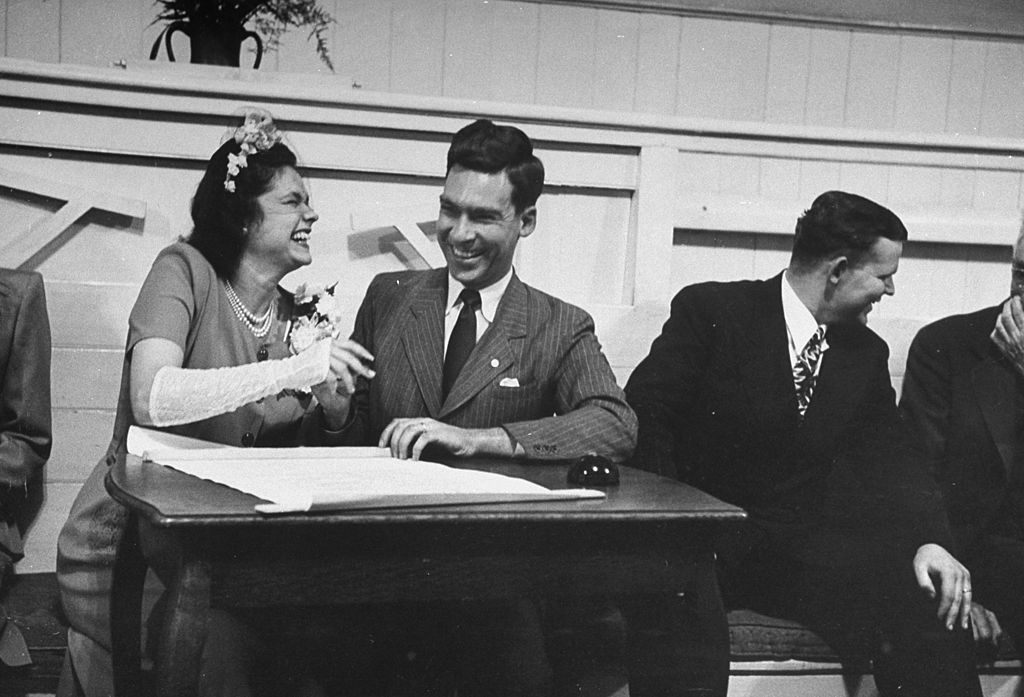
A Quaker wedding in Philadelphia, 1947. (Photo: Leonard Mccombe/The LIFE Images Collection/Getty Images)
Ryan Boswell was running out of time.
He and his fiance, Briana, who grew up in the western suburbs of Philadelphia and now live in the city, were casually planning their wedding. But Boswell’s father, though he’d been ill for a few years, began deteriorating quickly, and suddenly the wedding preparations took on a more manic tone. “We need to do this now,” Boswell says he felt at the time. “I really want him to see this.”
Planning a wedding is a brutal slog that takes months of work: booking venues, figuring out everything from officiants to clothing to invite lists to hotels to staff to food. Ryan and Briana didn’t have that kind of time, so Briana went looking for something quicker. “She went on the Philly [county] website and it says on there, marriage certificate, 80 dollars, Quaker certificate, 90 dollars, and she was like, well, what does that mean?” says Boswell.
It turns out that Pennsylvania is not just home to its own all-purpose noun and its own ancient tiny house design: it’s also the only state that allows all of its residents to become married via what’s legally called a self-uniting marriage, or informally a Quaker marriage (or, depending how you look at it, one of two states). It’s a centuries-old tradition that’s found a place in modern Pennsylvania law, and it is, weirdly enough, one of the most progressive marriage laws in the country.

An engraving of William Penn. (Photo: Library of Congress/LC-USZ62-12218)
The state’s laws have long been an improbable mix of conservatism and liberalism, much of which can be traced back to its Quaker heritage. Quakers were so vital to early Pennsylvania that they managed to get some laws passed that wouldn’t fly elsewhere in the colonies (or, later, the States).
In 1681, King Charles II of England gave the colony of Pennsylvania to William Penn, a British Quaker, to repay a debt. King Charles named it Pennsylvania, and by all accounts Penn, who wanted to name it New Wales, was embarrassed at having a whole colony named after himself. With Quaker teachings in mind, Penn made his new domain a place open to any religion, and his fellow Quakers settled in the eastern part of the state, helping to construct Philadelphia.
Then as now, Quakers are tolerant by doctrine of all other religions, and opposed to violence of any kind. Women are encouraged to be as central in the religion as men. More conservative Quakers are also well-known for “plain dress,” use of the word “thee,” teetotalism, opposition to abortion, and, sometimes, opposition to same-sex marriage.

A stereoscopic view of a Quaker Almshouse in Philadelphia. (Photo: New York Public Library)
Though in some ways the Quaker religion, referred to by Quakers as the Religious Society of Friends, is a cousin of Protestantism, it differs in quite a few pretty major ways. One of those is that the Quaker services can vary from a a congregation led in prayer by one person, to what’s called an unprogrammed meeting. (“Meeting” is the Quaker term for a religious service.) Unprogrammed meetings are a representation of the church’s classless dictum; sometimes conducted in silence, the town hall-like events see congregation members speaking to the rest of the group as they feel the urge, allowing the voice of God to channel through them.
Because of the disdain for ministers or priests, the idea of an approved member of the clergy serving as an officiant for a marriage is pretty much a no-go. So Quakers have for centuries conducted a different kind of marriage ceremony: the two people getting married give a short pledge to each other, then their marriage document is signed by witnesses.

A marriage certificate from 1906. (Photo: Named Faces from the Past/CC BY-SA 2.0)
Since Quakers were so influential in the state, Pennsylvania created a loophole for non-officiated marriages, sometimes either called Quaker marriages or self-uniting marriages, which has existed in the state as long as there were marriage laws. More than 330 years later, Quakers are still major parts of the population and culture of Philadelphia and its surrounding areas, but in 2007, a federal lawsuit opened up the self-uniting marriage to all Pennsylvanians.
Back in 2007, a couple in Allegheny County, an area which includes Pittsburgh and is about a five-hour drive from the more Quaker eastern part of the state, ran into a problem. They applied for a self-uniting license, but were denied because they identified as non-Quaker.
Shortly after, the couple, with the help of the ACLU, filed a discrimination lawsuit against the county, and won: it is now decreed that in the state of Pennsylvania, a county may not deny Pennsylvania marriage rights to a Pennsylvanian, or Quaker marriages to a non-Quaker. (This doesn’t stop some of the western counties from giving those seeking self-uniting marriages a hard time, according to some messageboards.)
Pennsylvania is not completely alone; Colorado, a state with basically no Quaker influence, allows self-uniting marriages and makes no reference to religion whatsoever. Wisconsin makes allowances for self-uniting marriages to those whose religions use it, but it’s unclear how this plays out in practice. Many states, including conservative states like Alabama and Florida, already have laws on the books stating that, even though they may not issue self-uniting marriages, they’ll respect them.
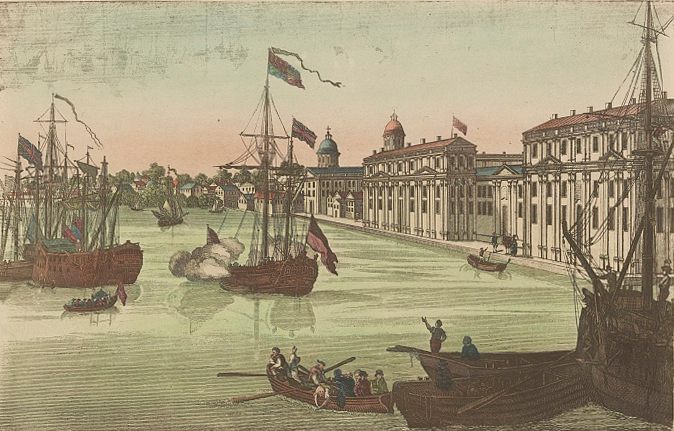
An 18th century engraving of boats on the Philadelphia waterfront. (Photo: Library of Congress/LC-USZ62-22392)
Despite being a transplant from a religious law in the 17th century, self-uniting marriage is right at the forefront of one of the many marriage debates going on in this country. The biggest of those is, of course, gay marriage, but it’s far from the only one. Indeed, the self-uniting marriage is a weapon against the existence of religion in marriage altogether.
Even for couples who decide on an elopement at City Hall, the process is still imbued with religion. In New York City, for example, City Hall marriages are performed by a certified officiant in one of two chapels on premises. Even if all you want to do is put ink on paper, there has to be some kind of religion involved.
“Why, and for what purpose, do we still require that parties solemnize—at all?” wonders family law professor Erez Aloni, of Whittier Law School. “That is, why isn’t a marriage license enough? I believe there is no reason today to require parties to go through this ceremony.”
Most states require that an officiant represent some sort of church or congregation. This is even a requirement for civilians who get their officiant’s license online to officiate their friends’ weddings (for this, many people opt for the Universal Life Church, a vaguely Christian organization that grants licenses to “ministers”). This isn’t like becoming a notary, though, where you just get a license from the government. Marriage in America, though it is a legal condition, almost always requires religion of some sort. It is, frankly, kind of bizarre.
The self-uniting marriage has thus become a very narrow option for atheists as well as people who don’t want to spend a few hundred dollars on an officiant, or those like Ryan and Briana who are rushed for time. It is a way to get religion out of your marriage. There are many long threads about self-uniting marriage on the atheist sub-forums of Reddit, probably the internet’s most vocal group of atheists.
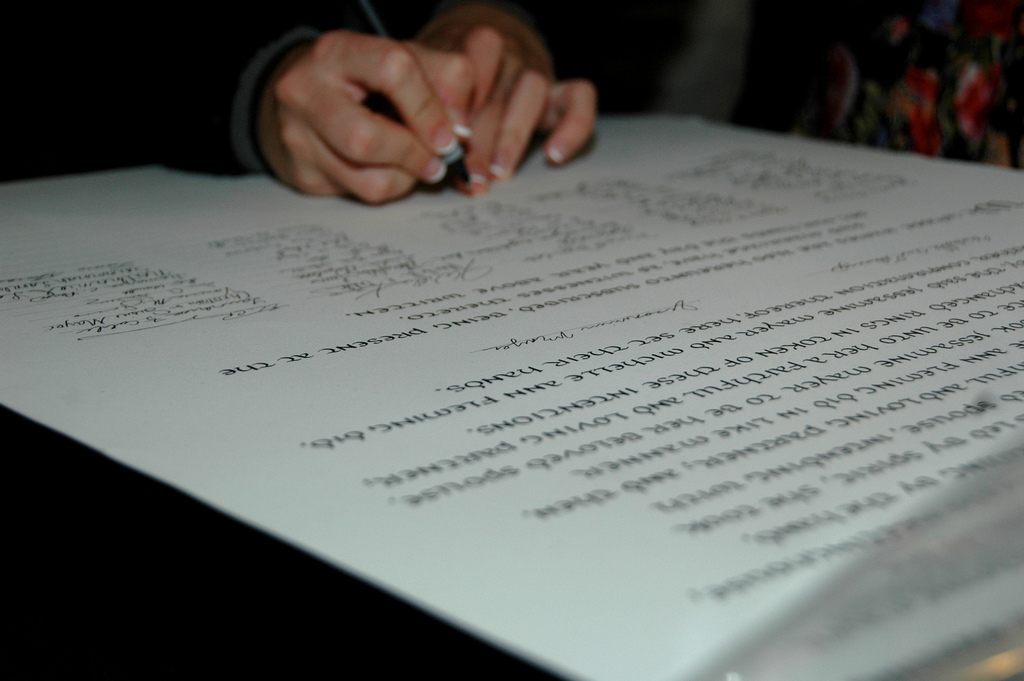
At a Quaker wedding. all those who have witnessed the ceremony sign the wedding certificate. (Photo: Mike Goren/CC BY 2.0)
That’s not really why Ryan and Briana opted for it. They needed something fast, and wanted something small, quiet, comfortable, and intimate. Instead of a sterile City Hall experience, they brought both families over for dinner. Briana made a short speech to their slightly confused families. Finally Briana’s mother asked when the ceremony would be, and whether they were heading down to City Hall to sign the papers. “Nope! This is it,” the couple told her. “This is the ceremony.”
Both the bride’s and groom’s fathers signed their self-uniting marriage license as witnesses. Dick Boswell, Ryan’s father, passed away shortly after the ceremony, but he was able to see his son get married. “I got to see my dad tear up a little bit, and God, I never saw that before,” says Boswell. “It seemed to really touch him, and that was really worth something to me.”
The fact that he and Briana grew up in Pennsylvania wasn’t really a factor in his deciding to opt for such a Pennsylvanian marriage. It just felt right. “Now we’re putting together this reception, for all the family and friends, and it’s such a big ordeal, and it’s all about showing off and consumption and stuff,” says Boswell. “And, I don’t know. What we did, I just couldn’t imagine anything more meaningful than that.”




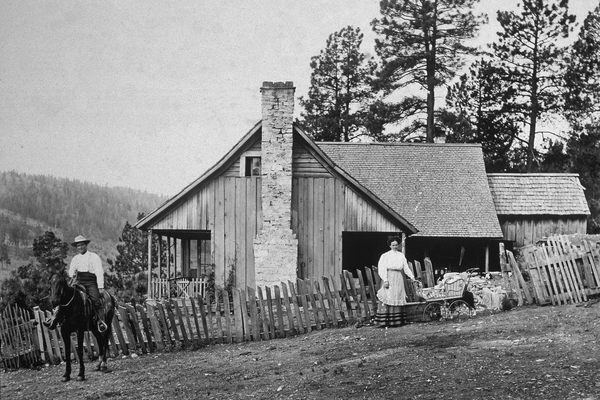
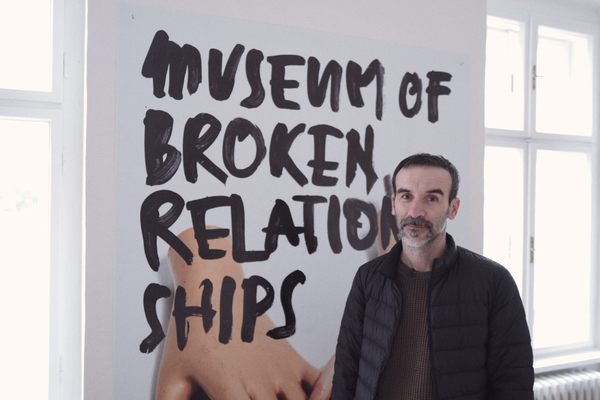











Follow us on Twitter to get the latest on the world's hidden wonders.
Like us on Facebook to get the latest on the world's hidden wonders.
Follow us on Twitter Like us on Facebook